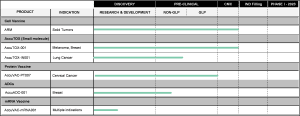
Defence Therapeutics Inc. is pleased to update its stakeholders on its completed achievements and outline the future milestones for AccumTM set for 2023.
Over the last three years, Defence has been active in developing its AccumTM-based platform pipeline. The Defence strategy and priority is to prove and exploit the versatility of the AccumTM technology, demonstrating that it can be used in multiple verticals, including:
- The development of a cell-based anti-cancer vaccine targeting solid tumours,
- The use of AccuTOXTM, a small variant molecule derived from AccumTM backbone, as an anti-cancer injectable for solid tumours,
- The design of an intranasal AccuTOXTM formulation to treat lung cancer using a non-invasive approach,
- The development of a protein-based anti-cervical cancer vaccine with dual functions (prophylactic and therapeutic),
- Advancing our breast-cancer-specific antibody-drug conjugate (ADC) programme to initiate a GLP study, and finally,
- Investigating the boosting potency of AccumTM applied to the mRNA vaccination platform.
The work conducted on each of the listed programmes below is briefly described, with much more news and updates to be released as development and advancement occur. The company will also entertain and evaluate the possibilities of partnerships, licensing of the technology and strategic joint development opportunities.

Development of a cell-based anti-cancer ARM vaccine
Defence used a variant of the AccumTM (the A1) to reprogramme innate mesenchymal stromal cells into antigen-presenting cells. This “off-the-shelf” universal vaccine (e.g. allogeneic to the recipient) can cure animals with pre-established lymphoma and melanoma. The observed therapeutic effects synergised with the use of the anti-PD-1 immune-checkpoint blocker. The vaccinated animals survived, and the great majority rejected the established tumour and remained tumour-free for over three months. Defence initiated the manufacturing of its ARM vaccine in Q1 of 2023 to start treating patients with solid tumours in Phase I clinical trials by Q4 of 2023.
AccuTOX as an anti-cancer injectable
Cancer can be described as a state of uncontrolled cell proliferation. This is mainly due to losses in the ability of a given cell to activate its own cell death via a specific set of proteins known to sense unusual activities. Although it is difficult to reactivate these specific pathways to elicit cancer cell death, AccuTOXTM can address this challenge. AccuTOXTM, an AccumTM variant, can control cancer growth when injected directly into tumours. AccuTOXTM, in combination with multiple immune checkpoints, results in a survival rate ranging between 60% and 100%, based on the pre-clinical tumour models studied in mice.
As for the AccuTOXTM mode of action, a non-biased transcriptomic analysis revealed that the compound impairs pathways crucial to cellular function, including DNA replication, cell division, nuclear integrity, and multiple modifications affecting DNA activity. The accumulation of exhaustive cell repair mechanisms triggered by AccuTOXTM combined with the build-up of misfolded proteins and generation of free radicals induces irreversible DNA damage, leading to a general collapse in several cellular pathways resulting in effective cancer cell death.
The Defence team completed all preclinical and GLP studies on the AccuTOXTM molecule as an injectable for solid tumours. The results showed that the drug can halt tumour growth and synergise with multiple immune-checkpoint inhibitors. Defence also demonstrated, in GLP toxicity studies, that the compound is safe and well tolerated using both rodent and canine animal models. Defence is working with City of Hope (Los Angeles, CA, USA) to prepare the IND package filing to initiate a Phase I clinical trial in melanoma patients.
An intranasal AccuTOXTM formulation for lung cancer
The previous success obtained with AccuTOXTM prompt the company to test an intranasal formulation in animals with pre-established lung cancer. Following the completion of MTD studies to identify the best dosing regimen, AccuTOXTM administration was shown to decrease by over 50% the number of cancer nodules, especially when combined with the anti-PD1 immune-checkpoint inhibitor. Defence is working with a US-based company to identify the best medical device for its AccuTOXTM delivery. GLP tox studies in dogs and rats have begun with the objective of measuring the safety of the formulation using a medical spray device. This milestone shall be followed by IND package filing to obtain approval for initiating a Phase I clinical trial against lung cancer. By demonstrating great safety and tolerability profiles in patients, AccuTOXTM can become the next-generation anti-cancer treatment for a wide range of indications.
An engineered protein-based vaccine targeting cervical cancer
Cervical cancer is caused by the human papillomavirus (HPV), a sexually transmitted infection. Following epithelial cell exposure to this virus, various viral-derived proteins initiate a series of transformational events leading to cell immortalisation and tumour development. Despite efforts to reduce cervical cancer prevalence, there is currently no cure for this cancer besides the standard of care (surgery).
Defence used its proprietary AccumTM platform to engineer the AccuVAC-PT007, a protein-based vaccine targeting the E7 oncoprotein of the HPV virus. Defence’s AccuVAC-PT007 provides complete protection against cervical cancer (prophylactic vaccination) despite multiple challenges. The vaccine was also effective at controlling pre-established cervical cancer growth, which was further amplified when combined with various immune-checkpoint inhibitors. For instance, AccuVAC-PT007 leads to 70% survival in rodents when used with either anti-PD-1 or anti-CTLA4. The anti-CD47 antibody, a blocker of cancer-mediated inhibition of efferocytosis by phagocytic cells, amplifies the anti-tumoral response boosting survival to 100%. Defence completed GLP studies on rodents and is currently looking to either begin a Phase I clinical trial on its own or to establish a partnership with a Pharma for this programme to initiate a Phase I clinical trial.
Advancing the AccumTM-ADC programme
The main clinical focus of ADCs companies has been in the field of breast cancer. However, the treatment regimen is long (numerous cycles), requires large doses, and the therapeutic response is limited. By re-engineering these ADCs to contain AccumTM moieties, Defence has demonstrated that it is indeed possible to improve the potency of commercially-available ADCs by more than 100 folds. This approach applies to commercially available ADCs, and Defence is currently working in parallel on developing its in-house product using its proprietary antibody and payloads. Defence is also optimising its formulation and evaluating different AccumTM variants to find the best combination for optimal efficacy. The objective is to begin GLP studies in 2023 before IND package filing for initiating a Phase I clinical trial against breast cancer.
AccumTM to boost the therapeutic potency of mRNA vaccines
The mRNA vaccination approach offers tremendous advantages over peptide- or protein-based vaccines. Unlike other biomolecules, mRNA is extremely sensitive to harsh conditions such as high acidity and enzymatic reactions, which would directly impede their therapeutic potency. In addition, mRNA molecules need to reach the cytoplasm, where they can be efficiently translated into full proteins. This is where AccumTM may add stability and potency. Defence is therefore working with a private European company to synthesise mRNA vaccine and its AccumTM. Defence has completed the first part of its AccumTM-mRNA vaccine development by achieving the synthesis and Quality Control of the amino-modified polyA tail mRNA. The company is currently working on the second step, which consists of coupling different AccumTM variants to amino-modified mRNA as well as testing and analysing the effect of AccumTM and linkers on mRNA stability, the linker coupling onto amino-modified mRNA, the AccumTM coupling onto linker-amino modified mRNA and the purification and analysis of the AccumTM-linker-amino-modified mRNA.
The third and final step of this AccumTM-mRNA vaccine development, scheduled in Q2 of 2023, will be the production of a small vaccine batch to conduct in vivo studies in animals. head-to-head comparison between AccumTM-linked and “naked” mRNA vaccines for their potential to generate an immune response capable of eradicating and controlling established tumours.
About Defence:
Defence Therapeutics is a publicly-traded biotechnology company working on engineering the next generation of vaccines and ADC products using its proprietary platform. The core of Defence Therapeutics platform is the ACCUMTM technology, which enables precision delivery of vaccine antigens or ADCs in their intact form to target cells. As a result, increased efficacy and potency can be reached against catastrophic illnesses such as cancer and infectious diseases.


















